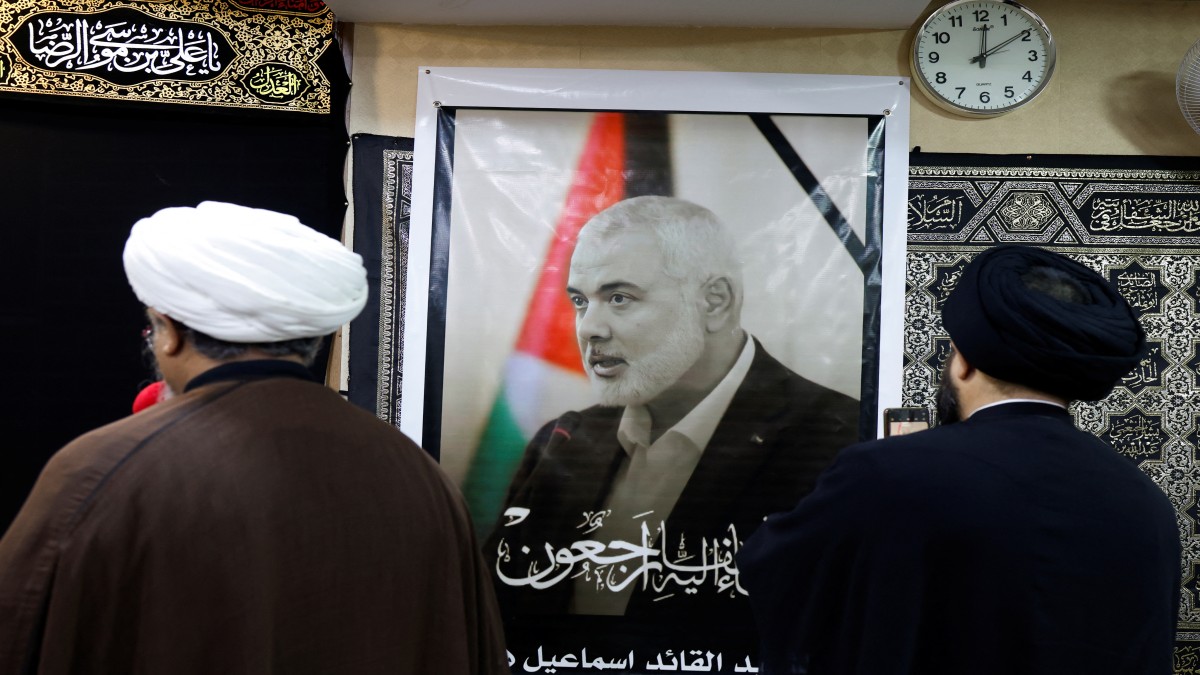Hamas chief Ismail Haniyeh’s assassination in Tehran earlier this week, which Iran blamed on Israel, has pushed the Middle East to the edge of a full-scale war read more
)
The Palestinian militant group Hamas is on the verge of selecting a new political leader following the assassination of Ismail Haniyeh in Tehran earlier this week. Reuters
In a near-prophetic manner, Hamas chief Ismail Haniyeh’s last known words were about life, death, and the continuation of the cause.
Haniyeh was assassinated in the early hours of Wednesday in Iran’s capital Tehran. He was killed in an explosion in his room at the guesthouse which was under the protection of the Islamic Revolutionary Guards Corps (IRGC). Both Iran and Hamas have blamed Israel for the assassination and have vowed revenge.
The assassination took place just hours after Haniyeh met Iran’s Supreme Leader Ayatollah Ali Khamenei. The meeting took place on the sidelines of the swearing-in ceremony of President Masoud Pezeshkian. The final words were broadcast on television.
‘If a leader leaves, another will rise’
In his final known words, Haniyeh quoted words from Islamic holy book Quran.
“It is Allah who gives life and causes death and Allah is all-aware of all actions. If a leader leaves, another will arise,” said Haniyeh, according to Reuters.
The agency reported that the verse has defined much of the Palestinian terrorists’ movement against Israel. It said that Haniyeh adopted the verse after being inspired by Hamas founder Sheikh Ahmed Yassin, who preached jihad against Israel in the 1980s.
Palestinian affairs expert Adeeb Ziadeh told the agency that Hamas was rooted in an ideology and killing Haniyeh will not finish off the group.
“Every time Hamas lost one leader, another leader came, sometimes even stronger in his performance and fulfilling Hamas principles,” said Ziadeh, an Assistant Professor in the Department of International Affairs at Qatar University.
Haniyeh is the third Hamas chief to be assassinated in two decades. In 2004, Israel killed the then-Hamas chief Yassin and then his successor Abdel-Aziz al-Rantissi within a month. Haniyeh’s most likely successor, Khaled Mashal, also survived an assassination attempt in 1997.
Middle East remains on edge
Following Haniyeh’s assassination, which came hours after the assassination of Hezbollah’s military chief Faud Shukr in Lebanon, has raised fears of an all-out between Israel and Iran that could envelop the entire Middle East.
Even though Iran-backed groups like Hezbollah and Houthis have been attacking Israel since the beginning of war last year, Israel and Iran have consciously avoided getting into a direct all-out conflict. Even as they exchanged direct barrages for the first time ever in April, the situation did not escalate into a war. But it is not certain if that’s possible now.
The brazen assassination of Haniyeh, which Israel has not acknowledged, has led to vows of revenge. The assassination not only took place in Tehran but took place when the nation was on high alert as the swearing-in ceremony was going on. Moreover, the attack took place in a building under IRGC’s protection. This meant that the assassination was a colossal embarrassment for Israel and catastrophic intelligence and security failure.
Following the assassination, Khamenei has reportedly ordered direct attacks on Israel.
As Israel braces for an attack from Iran, the United States has enforced the military presence in the region. It has deployed more aircraft and warships to help defend Israel like it did in April when it joined hands with the United Kingdom, France, Jordan, and Saudi Arabia. The increased presence will also work towards securing American interests and facilities in the region.

 1 month ago
16
1 month ago
16
)
)
)
)
)
)
)
)
)
)
)
)
)
)
)
)
)
)
)
)
)
)
)
)
)
 English (US) ·
English (US) ·